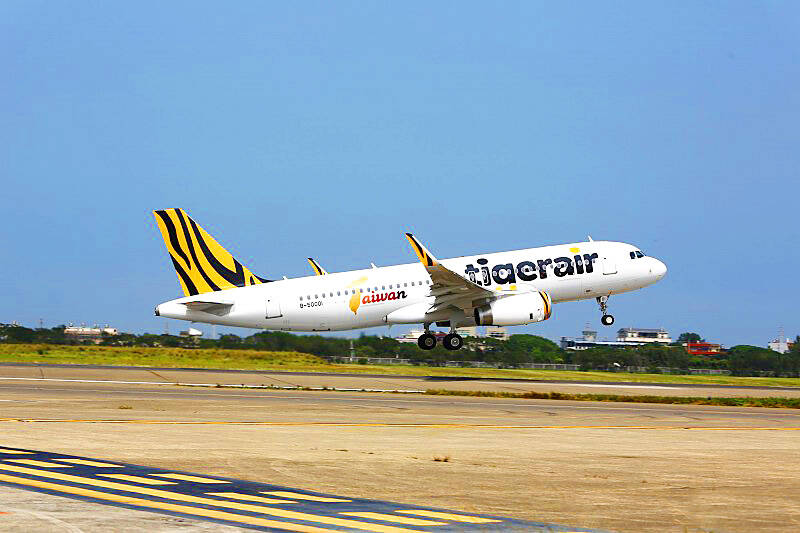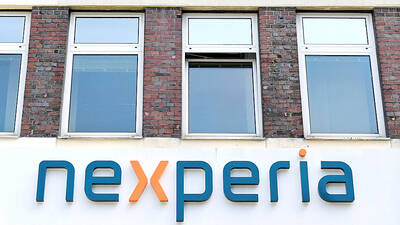Tigerair Taiwan Ltd (台灣虎航) is to list its shares on the Taiwan Stock Exchange’s Taiwan Innovation Board (TIB) in the third quarter of this year, the exchange said on Friday.
The budget carrier’s shares have been trading on the Taiwan Stock Exchange’s Emerging Stock Board since December 2019.
Tigerair Taiwan was established in April 2014 as a joint venture between China Airlines Ltd (CAL, 中華航空) and Singapore’s Tiger Airways Ltd, with CAL holding a 90 percent stake. In 2017, CAL acquired the remaining 10 percent from Tiger Airways to make Tigerair Taiwan its wholly owned subsidiary.

Photo courtesy of Tigerair Taiwan Ltd
CAL currently owns a 78.41 percent stake in Tigerair Taiwan, with Mandarin Airlines Ltd (華信航空), another CAL subsidiary, holding a 3.86 percent stake and Cathay Life Insurance Co (國泰人壽) taking a 2.49 percent share, according to the budget carrier’s prospectus published last month.
Tigerair Taiwan, which has NT$4 billion (US$131.3 million) in paid-in capital, incurred a net loss of NT$2.85 billion last year, extending from a net loss of NT$2.27 billion a year earlier, while its sales rose to NT$1.31 billion from NT$244 million in 2021, the prospectus showed.
The airline offers flights to 25 destinations in the region. Its revenue accounts for 2.64 percent of the total revenue of Taiwan’s international carriers. EVA Airways Corp (長榮航空) leads with 37.52 percent of overall revenue, followed by CAL with 25.62 percent and Starlux Airlines Co (星宇航空) with 5.73 percent.
CAL and EVA listed their shares on the local main board in 1993 and 2001 respectively, while StarLux listed its shares on the Emerging Stock Board in September last year.
Separately, the Taiwan Stock Exchange on Friday said that its board approved an application by Gogolook Inc (走著瞧), a trust tech services provider, to list its shares on the TIB in the third quarter.
The exchange launched the TIB in July 2021. It aims to encourage companies with key technologies and innovation capabilities to raise funds on capital markets, and “help companies achieve faster growth and sustainable development.”
According to the rules governing TIB listings, profitability is no longer the main listing standard.
The board would inject capital into the innovation ecosystem, build new financing sources, highlight the value of start-ups and foster the virtuous cycle of economic development, the exchange has said.

Jensen Huang (黃仁勳), founder and CEO of US-based artificial intelligence chip designer Nvidia Corp and Taiwan Semiconductor Manufacturing Co (TSMC, 台積電) on Friday celebrated the first Nvidia Blackwell wafer produced on US soil. Huang visited TSMC’s advanced wafer fab in the US state of Arizona and joined the Taiwanese chipmaker’s executives to witness the efforts to “build the infrastructure that powers the world’s AI factories, right here in America,” Nvidia said in a statement. At the event, Huang joined Y.L. Wang (王英郎), vice president of operations at TSMC, in signing their names on the Blackwell wafer to

AI BOOST: Although Taiwan’s reliance on Chinese rare earth elements is limited, it could face indirect impacts from supply issues and price volatility, an economist said DBS Bank Ltd (星展銀行) has sharply raised its forecast for Taiwan’s economic growth this year to 5.6 percent, citing stronger-than-expected exports and investment linked to artificial intelligence (AI), as it said that the current momentum could peak soon. The acceleration of the global AI race has fueled a surge in Taiwan’s AI-related capital spending and exports of information and communications technology (ICT) products, which have been key drivers of growth this year. “We have revised our GDP forecast for Taiwan upward to 5.6 percent from 4 percent, an upgrade that mainly reflects stronger-than-expected AI-related exports and investment in the third

RARE EARTHS: The call between the US Treasury Secretary and his Chinese counterpart came as Washington sought to rally G7 partners in response to China’s export controls China and the US on Saturday agreed to conduct another round of trade negotiations in the coming week, as the world’s two biggest economies seek to avoid another damaging tit-for-tat tariff battle. Beijing last week announced sweeping controls on the critical rare earths industry, prompting US President Donald Trump to threaten 100 percent tariffs on imports from China in retaliation. Trump had also threatened to cancel his expected meeting with Chinese President Xi Jinping (習近平) in South Korea later this month on the sidelines of the APEC summit. In the latest indication of efforts to resolve their dispute, Chinese state media reported that

CHINESE EXPORT CURBS: A dispute between China and the Netherlands could halt chip supply, affecting vehicle production, US and European auto associations said Groups representing major automakers late on Thursday warned that a chip disruption stemming from a dispute between China and the Dutch government could quickly affect US auto production. Automakers and their suppliers received notice from chipmaker Nexperia (安世半導體) last week that it could no longer guarantee delivery of its chips, the European Automobile Manufacturers Association said, adding that manufacturing could be significantly disrupted. In the US, the Alliance for Automotive Innovation, which represents General Motors, Toyota, Ford, Volkswagen, Hyundai and nearly all other major automakers, urged a quick resolution. “If the shipment of automotive chips doesn’t resume — quickly — it’s going to